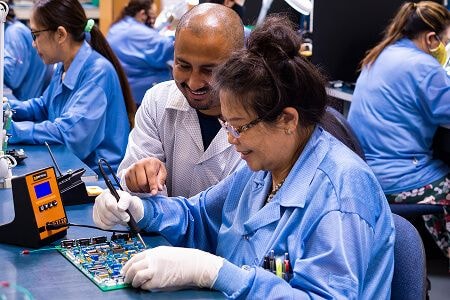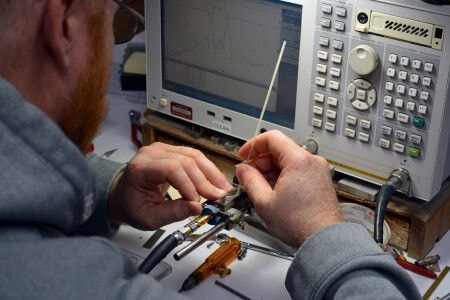
We must ensure the proper and efficient use of Dover property and protect it from theft, damage, loss, and misuse. “Dover property” includes our physical and intangible assets, such as facilities, equipment, vehicles, software, computers, funds, and supplies, as well as our network and computer systems, our power and energy sources, our ideas and innovations, and our confidential information and data. If you believe that anyone is placing the performance or security of Dover property at risk, such as through theft, carelessness, waste, or by violating Dover’s information security policies or intellectual property, you should immediately advise your supervisor or any of the resources listed throughout our Code.
Technological Equipment
We must use Dover’s equipment and assets for business purposes and to serve Dover’s interests. Equipment and assets include, but are not limited to, computer equipment, smart phones, software, operating systems, network accounts for email, and storage media. Dover owns or has been licensed to use the technology we use in our businesses, including hardware, software, and computer systems. This technology and the information stored on them are critical to our success. Everyone who uses a computer or other technological equipment at Dover is responsible for protecting these valuable technology resources, and using them within any designated limits.
We are responsible for taking proper security precautions when using Dover’s network and information technology systems. Be sure to secure your PCs, laptops, tablets, and workstations properly when unattended. If you are sending information considered sensitive or vulnerable, password protect or encrypt the information and follow our internal controls. For more information, please see our Global Data Privacy Policy and Data Security – Acceptable Use of Dover Electronic Equipment, Systems, and Data Policy, which both can be found on www.integritycounts.com. If you suspect that any of our sensitive information or systems have been compromised, immediately report your concern to [email protected].
You can reference our Data Security – Acceptable Use Policy via the button below.

Intellectual Property
Patents, copyrights, trademarks, and trade secrets are legal terms that define when an invention, product, written work, name, or any confidential information of value to Dover is owned by an individual or company and use of these by others is prohibited without express permission. Ownership rights in patents, copyrights, trademarks, and trade secrets are granted on a country-by-country basis.
We may sometimes develop ideas, processes, and technology on Dover’s behalf or in the scope of our work for Dover that will be protected by patents, copyrights, trademarks, or trade secret laws. This “intellectual property” belongs to Dover or Dover’s customers, depending on the situation. As required by law and the terms of our employment, each of us agrees to assign the rights to any such intellectual property to Dover or our customers, as appropriate.
Patents, copyrights, trademarks, and trade secrets belonging to others may not be used without express permission from the owner. This includes all digital assets (photo, video, and multimedia) and references to customer projects. We must ensure to respect the intellectual property of third parties, including but not limited to our business partners. Never copy or use proprietary data, product drawings, user manuals, names, or software created by someone else without obtaining the required authorization from the author or owner. Never plagiarize or make inappropriate use of articles or materials published by others. In addition, never download, open, or use computer software for which there are no software licensing agreements, which could violate copyright laws, or that does not have a business purpose. You should communicate with the IT Department prior to downloading, opening, or using any software. Seek advice from the Dover Law Department if you have any questions or concerns regarding intellectual property rights to ensure appropriate protections are in place and the right course of action occurs.
Confidential Information
Our proprietary and confidential information is one of our most important assets. “Proprietary and confidential information” generally includes nonpublic information of Dover (which includes any of our operating companies) that, if revealed, might actually or potentially benefit our competitors and/or harm Dover or its customers. This includes all information, in any format, that we have a legitimate business interest in protecting.
You must be vigilant, both on and off the job, in protecting our proprietary and confidential information with the utmost care. You may provide this information only to co-workers or outside third parties who have a legitimate business need to know it or when such disclosure is legally mandated, under guidance and direction from the Dover Law Department. In all cases, however, be sure to follow the safeguards put in place to protect this information from unintended or deliberate disclosure or misuse. For more information on our safeguards, see our Data Security – Acceptable Use of Dover Electronic Equipment, Systems, and Data Policy, which can be found on www.integritycounts.com. Never discuss proprietary and confidential information in a place (public or otherwise) where outside parties can overhear you.
We also are expected to protect one another’s personal information. It is critical that we follow all applicable privacy, information security, and data protection laws that govern the handling of private and sensitive information. For more information, see the “Personal Data and Data Privacy” section.
Dover may have joint venture partnerships with companies that might also be our competitors, suppliers, or customers in other circumstances. While communication in joint ventures is critical, we must take reasonable steps to protect our proprietary and confidential information from accidental and inappropriate disclosure or use outside the joint venture context. We must abide by all Dover joint venture agreements that specify and limit access to Dover’s information and systems to certain individuals.
The confidentiality obligations set forth in this section extend beyond the scope and term of our employment or other service with Dover and continue even after our employment or other service ends.
Examples of Confidential Information
- Technical information
- Product and production designs
- Process and manufacturing data and protocols
- Personal data
- Information about products in development
- Inventions
- Financial data and models
- Pricing, cost, and sourcing information
- Development, acquisition, or divestiture plans
- Marketing plans
- Customer and supplier lists (both current and historical)
- Business strategy
Question
I ride the train to work on a daily basis. I sometimes begin my workday on the train by returning calls I may have missed the night before. Is this a problem?

Answer
You must take care to only discuss information that is publicly known while you conduct business outside of your office. When making a telephone call in public places, such as restaurants, trains, elevators, or at conferences, make sure you do not discuss confidential information that others may hear.
Generative Artificial Intelligence
Dover has a policy regarding the use of Generative Artificial Intelligence (Gen AI) tools by Dover and its operating companies, which you should review and abide by when you use any Gen AI tools for work purposes. You are responsible for using Gen AI tools in a productive, ethical, and lawful manner at all times. For more information, see our Gen AI Tools Policy, which can be found on www.integritycounts.com.
Electronic Communications
Dover provides resources such as computers, phones, and other physical assets to enable us to conduct business. While we are allowed limited personal use of these assets, such personal use must not detract from the performance of our duties or violate any Dover policy or applicable law. We may not use these resources to improperly disclose or misuse our proprietary and confidential information, conduct illegal activities, access or download obscene or sexually explicit material, or communicate discriminatory, harassing, or threatening messages. You have no expectation of personal privacy in connection with the use of these Dover resources, subject to applicable law. Dover reserves all rights, to the fullest extent permitted by applicable law, to monitor and review any messages, internet browsing history, and other information sent, received, or viewed using Dover resources.
For more information, see our Global Data Privacy Policy and Data Security – Acceptable Use of Dover Electronic Equipment, Systems, and Data Policy, which can be found on www.integritycounts.com.

Records Management
We often deal with large quantities of documents and records, both paper and electronic. It is important that you know the policy regarding how long to retain these documents and records, and when and how you are required to dispose of them. All records that relate to your work are the property of Dover, including those that you may have authored or helped to prepare. Records can include forms of communications such as emails, text messages, and postings on social media platforms run by or related to Dover and its operating companies. If you are notified that documents in your possession are relevant to any pending litigation or an investigation or audit, do not alter, delete, or destroy the documents and follow the guidelines set forth in the notification. For more information, see our Records Management Policy, which can be found on www.integritycounts.com.
Press Inquiries
As a global company, it is important we speak with one voice and have a consistent message. Therefore, only designated spokespersons within Dover may make certain statements to the public. Should you need assistance with media inquiries, or if you are contacted by a member of the media, contact the spokesperson of your operating company or Dover’s Communications Department. If you receive a request for information from analysts, investors, or potential investors, forward the request to Dover’s Investor Relations Department. You must never attempt to speak on Dover’s behalf when not authorized to do so.
Question
I received a call from a financial reporter who said she understands that we are going to acquire Widget Corporation. Can I tell the reporter, off the record, that it’s not true?

Answer
No. First, no one may speak on behalf of Dover without permission, on or off the record. Second, you may not know the true situation and, as a result, may be making an untrue statement. In addition, this is confidential information that must not be disclosed. Contact the Communications Department to discuss further.


Social Media
The same basic principles and guidelines included in this Code apply to your social media activities. For more information, see our Social Media Policy, which can be found on www.integritycounts.com.